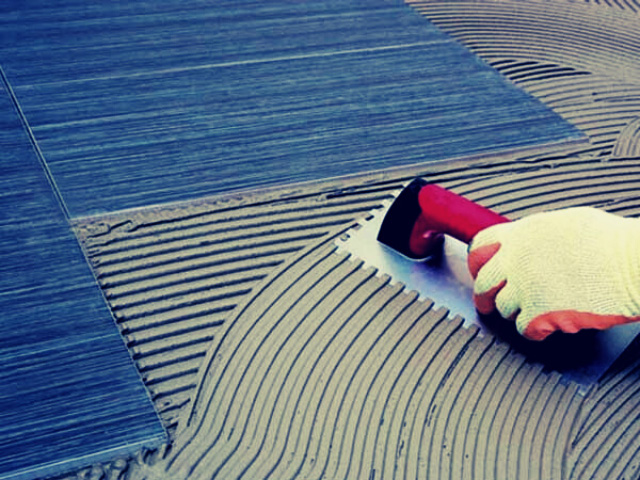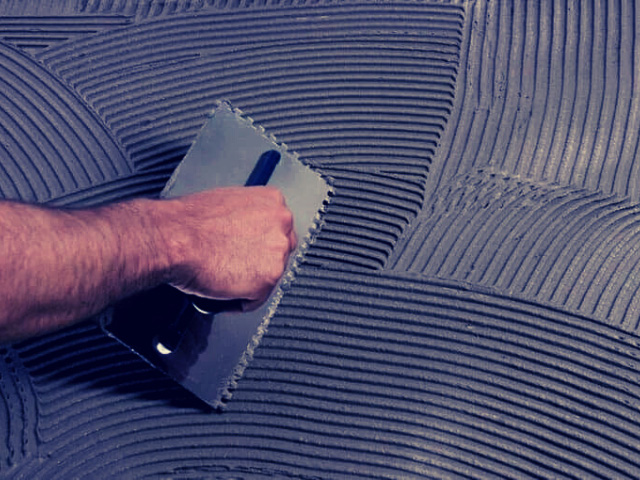Thinset mortar and adhesive are both common tile-installation additives that help you achieve an even and secure bond between the tiles and the wall surface.
Each product has its unique properties and performance standards, so it’s important to understand its pros and cons before beginning your project.
If you’re not sure which construction material is best for your space, this article breaks down the details of tile adhesive vs. thinset mortar so you can make a more informed decision.
Read More: Best Adhesive For Ceramic Tile On Concrete
Read More: Adhesive Tile Mat vs. Mortar
Tile Adhesive vs. Thinset Mortar
What is Tile Adhesive?
Adhesive refers to a pre-mixed construction material that’s designed to bind wall surfaces and tiles together. These are usually solvent-based, which means that you’ll need to apply pressure to the bond for it to set and dry.
Construction adhesives commonly come in liquid form and are designed to be applied with a caulking gun. Some tile-adhesive brands can be applied as a powder, but most are liquid-based. Different types of tile adhesives are designed to work with various materials and adhere to different surfaces.
For instance, you might use a silicone-based adhesive to bind natural stone tiles to a concrete wall surface, while you’d opt for a urethane-based adhesive to bond man-made materials like ceramic tiles to the same type of surface.

What is Thinset Mortar?
Thinset mortar is a construction adhesive that’s specifically designed to bond tiles to a wall surface. Unlike tile adhesives, which are used to bind tiles together, thinset mortar is used to bind the tiles to a wall surface.
This construction adhesive comes in powder form and is usually applied using a trowel. Thinset mortar can be applied to a wide variety of wall materials, including cement board, concrete, drywall, and ceramic tile.
The mortar contains a high amount of water, which helps it to flow freely when applied. The high water content also helps the mortar to cure quickly, making it a suitable construction material for use on time-sensitive projects.
Read More: Best Thinset for Shower Walls
Pros of Using Tile Adhesive
Tile adhesives are a suitable construction material for any type of tile. This makes them an excellent option for those with an existing tile layout. It’s possible to use an adhesive to re-attach the tiles to the wall surface if they’re coming loose.
Tile adhesives are easy to apply and offer a strong, reliable bond between the tiles and wall surface. They’re also durable, which means they can withstand regular foot traffic and everyday wear-and-tear.
Tile adhesives come in a wide range of thicknesses, allowing you to choose the ideal option based on the type of tile you’re installing. Tile adhesives are flexible, making them suitable for use on a wide range of wall surfaces. They’re also easy to apply, making them a great choice for DIYers.
Read More: White Vs. Gray Thinset

Pros of Using Thinset Mortar
Thinset mortar is the suitable construction material for any type of tile. You can use a mortar-based adhesive to re-attach the tiles to the wall surface if they’re coming loose.
Thinset mortar is easy to apply and features a strong, reliable bond between the tiles and wall surface. This makes it an ideal option for tiles, wall surfaces, and DIYers who need a reliable construction material that’s easy to work with.
Thinset mortar can be applied in either a powder or premixed form, which allows you to choose the best option for your project. Premixed mortar is available in a range of thicknesses, allowing you to select the ideal option based on the type of tile you’re installing.
Read More: Masonry Adhesive vs. Mortar
Cons of Using Tile Adhesive
Tile adhesives are more difficult to apply than thinset mortar. This can make them a less-than-ideal option for DIYers who need quick, easy construction material.
Tile adhesives are less durable than thinset mortar. This means that they can’t withstand regular foot traffic and everyday wear-and-tear as well as a mortar-based construction adhesive.
Tile adhesives don’t provide as strong of a bond between the tiles and wall surface as a thinset mortar does. This makes them a less-than-ideal option for tiles that are installed close to the wall or have a large grout space.
Cons of Using Thinset Mortar
Thinset mortar is a more difficult construction material to apply than tile adhesive. This makes it a less-than-ideal option for DIYers who need a quick, easy construction material.
Thinset mortar provides a stronger bond between tiles and wall surface than tile adhesive. This makes it more suitable for tiles that are installed close to the wall or have a large grout space. Thinset mortar is less flexible than tile adhesive.
This means that it’s less suitable for use on a wide range of wall surfaces. Thinset mortar takes longer to cure than tile adhesive. This means that it’s less suitable for use on time-sensitive projects.
Which is better tile adhesive or thinset?
Is thinset the same as adhesive?
Is tile mortar the same as tile adhesive?
Last Opinion
Tile adhesives and thinset mortar are both construction materials used to attach tiles to a wall surface. Adhesives are applied in liquid form, while the mortar is applied as a powder.
Both are applied to the wall surface, while adhesive is applied to the back of the tile. Which construction material is better for your project will depend on your wall type and tile type.
While both materials are strong and durable construction adhesives, thinset mortar is easier to apply and cures faster than adhesive. This makes it a better option for DIYers who need quick and easy construction material.

